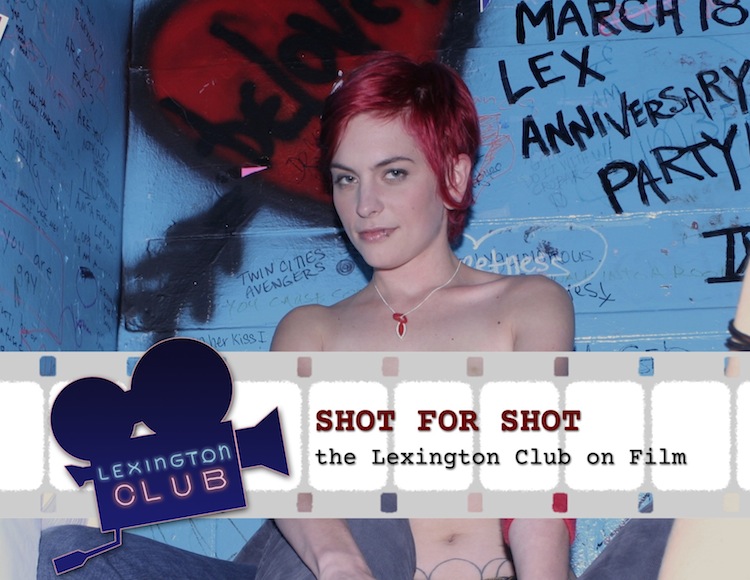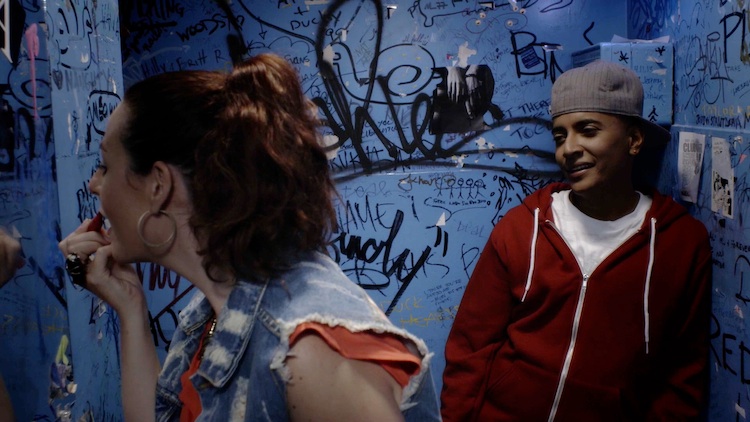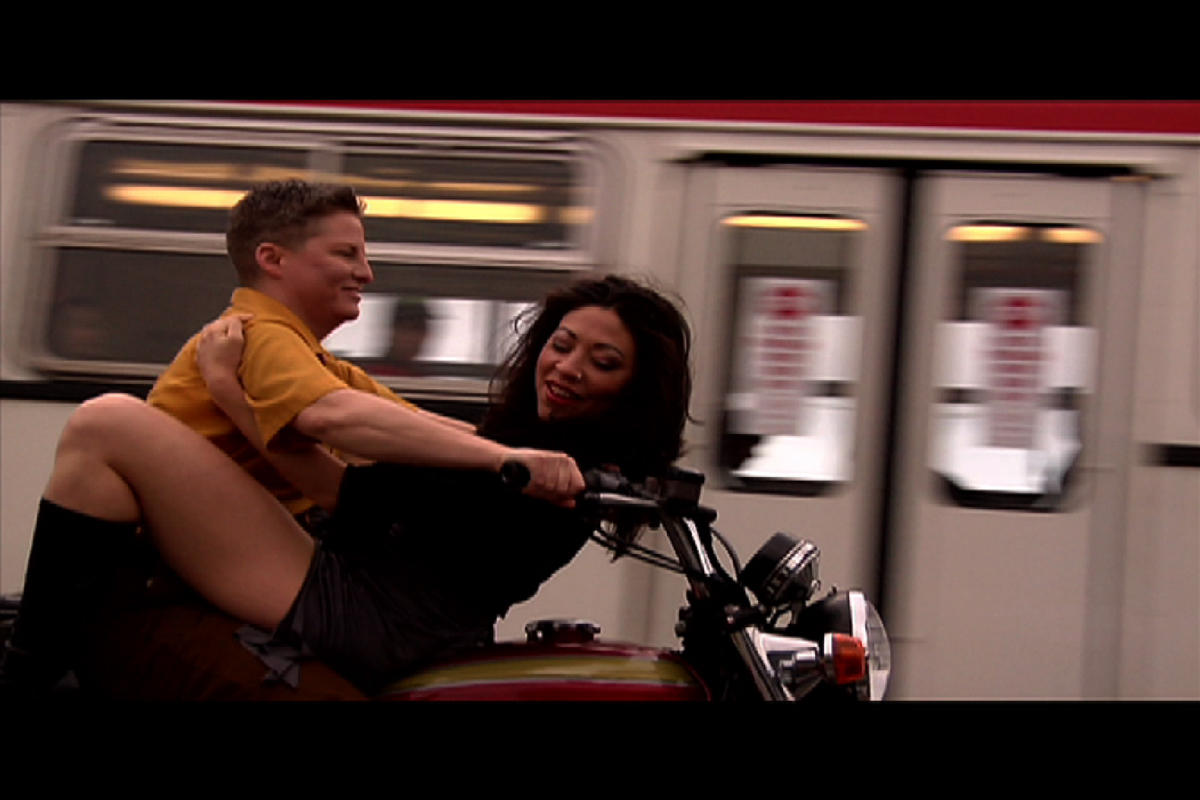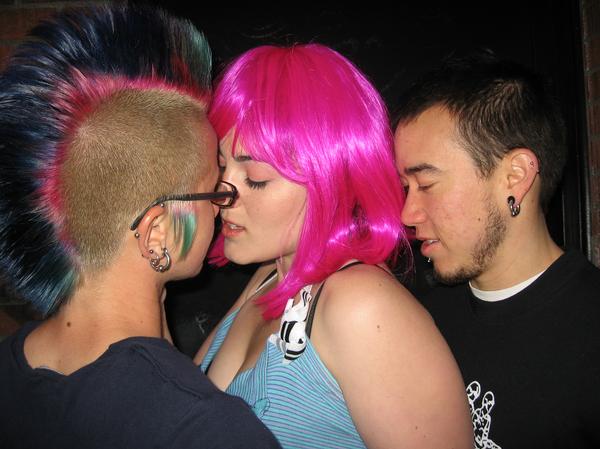On eve of closure, legendary lesbian watering hole the Lexington Club comes alive onscreen at Roxie Cinema, on Sun. Jan. 25

When word came down last October that the San Francisco’s sole dedicated lesbian bar the Lexington Club was closing due to gentrification and income inequality, most of the population understandably rent their garments and tore their hair. Lila Thirkield’s feisty 18-year-old watering hole was an institution that fostered a family feel and a spirit of queer resistance, and its impending closure signaled a huge loss for the community and city at large.
Patrons were given a few months to grieve before the doors shut for good — but time is rapidly running out. The bar just announced its final art show, and everyone, sadly, is preparing to down their final Lex shots.
HOWEVER! The vibrant, rebellious, slightly tipsy spirit of the Lex continues to inspire. Director Elena Oxman, who teaches film studies at the College of San Mateo, had the brilliant idea of throwing a mini film festival featuring movies that had been shot at the colorful bar. Called “Shot for Shot: The Lexington Club on Film” and taking place at the Roxie Cinema Sun/25 at 7pm, the special night features eight short and short(ish) flicks that used the Lex as a location.

Ranging from Jackie Strano’s How to Pick up Girls and Mary Guzman’s Mechanic’s Daydream to Michelle Tea’s beloved anthology Valencia and Oxman’s own Lit, “Shot by Shot” promises an evening of uproarious remembrances and probably a few tears. I spoke with Oxman about the importance of the Lex to the local film and arts community, and what might be lost when it finally bids farewell.
48 Hills Putting together a night of films shot at the Lex in a kind of tribute is a pretty genius idea. How did it come to you?
ELENA OXMAN I had shot parts of my short film Lit at the Lexington Club in 2013 and had begun talking to Ben, the Lex’s manager, about holding a screening at the bar sometime last fall. When Lila announced that she’d be closing the bar this year, I started asking around about other films that had shot there over the years and it turned out other people had been thinking the same thing– why not find these films and gather them together as a kind of tribute to the Lex?

48H Eighteen years of filming history is a long time. How did you go about contacting the other filmmakers? Was it easy to convince the filmmakers to take part?
EO I initially reached out to Des Buford, a programmer at Frameline film festival whom I met when Lit screened there last year, and she gave me a bunch of leads on films/filmmakers. So did Jenni Olson, a local filmmaker and queer historian. Both of them have been around the queer filmmaking community longer than I have and they were super helpful in thinking of filmmakers that shot or may have shot there.
It’s funny because when I initially started asking around, most people could remember seeing the Lex on screen but couldn’t remember where, or had hunches about films that may have shot there but weren’t sure. When I started connecting with the filmmakers, everyone was very very enthusiastic about the idea. I think everyone felt a lot of sadness at the news of the bar closing, and this seemed a good way of paying tribute to a place that has meant a lot to so many people over the years.
48H Can you tell me about the content of some of the films, including your own? What can we expect?
EO There’s a real range! All of them are queer films, but they differ in form and content. A couple of the short film tell stories about chance encounters or relationships that play out in or around the Lex and capture its moody, late night feel. Then we have some comedies and mockumentaries that capture the lighter side of the Lex (including its infamous bathroom, which I learned from watching the films has not always been turquoise blue).
Some of the films have played big festivals like Sundance and Frameline and some were made for fun. What’s cool about the program is that in almost all the films, the Lex plays itself … even in the fictional films it’s referred to by name, which tells you something about its iconic status.
48H I really freakin’ love this idea of immortalizing the Lex this way — do you know of any other clubs or bars that have done this kind of thing?
EO No, I don’t… but I also think the Lex stands out among bars because of the meaningful role it played in peoples lives. It’s not just a place to drink. It is/was a community, a safe place for queer people, an art space (there’s always art on the walls, and Lila the owner was obviously open to letting filmmakers shoot there, which is rare and generous), a queer family living room, and also a place to drink have fun. You can feel the interweaving of all the elements and I think that’s what made it stand out to people. The films that were shot there pay tribute to the Lex, but the Lex had already immortalized itself by becoming so much more than a bar.

48H I can really feel your affection and personal connection to the Lex with this. How did you feel when you heard about the closing?
EO I moved to the Bay Area a couple years ago and currently teach film studies at the College of San Mateo. I found the Lex shortly after moving here. I didn’t know that many people in town and always just felt comfortable there– it was divey and relaxed and welcoming.
I also fell in love with a girl I used to see there, who’s now my girlfriend, so that was a part of my personal Lex story. My girlfriend grew up in San Francisco and told me about the Lex’s importance to queer people living and growing up here. I saw that for myself too — the Lex’s history is literally written on its walls, and it was that kind of unique visual atmosphere, in addition to the autobiographical element, that led me to shoot parts of Lit there.
Hearing that the bar was closing was sad. It’s the same thing that’s been happening for a while now in so many places. Gentrification feels like this giant bulldozing effect… something you can’t do anything about because the economic imperative comes first, and small business owners like Lila have no choice but to close when it’s no longer profitable. I think these losses mean a lot though — they are part of the city losing its soul, becoming a place that looks a little more like every other place (and catering to a smaller and smaller group of people).
I think it’s really important not to let those losses go unnoticed, and that’s a lot of what drives me as a teacher and filmmaker. It’s not just a matter of being nostalgic but of actually trying to articulate and make visible what we are losing. The hopeful part, I think, is that in talking about that loss of soul I think we plant the seeds for it to spring up somewhere else. Because at the end of the day it’s not about the buildings or bars themselves, but the people who occupy them, and what they build inside.
SHOT FOR SHOT: THE LEXINGTON CLUB ON FILM
co-presented by Good Vibrations, Frameline and the Lexington Club
Sun. Jan. 25, 7pm, $10
Q&A with filmmakers afterwards
Roxie Cinema
3117 16th St., SF
www.roxie.com
GET TICKETS HERE







